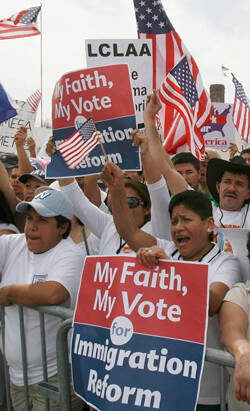After years of neglect and partisan hyperbole, immigration reform is finally taking shape. Both the president and Senate leaders announced proposals last month to guide the legislative process. As of this writing, the principal difference between the plans concerns the path to citizenship for the estimated 11 million undocumented immigrants living in the United States. President Obama wants this process to move forward without preconditions, while Republican leaders are pushing for implementing border control measures before opening up the path to citizenship.
The debate promises to be long and perhaps heated, but leaders of both parties should not let this chance slip away. The nation’s undocumented immigrants have been left in limbo for too long; they deserve a chance to play a public, productive role in society. Some will deride any path to citizenship as “amnesty,” but as people of faith we know that sometimes such broad acts of charity are called for. Political leaders should not be afraid of exercising their powers in the cause of mercy.
The details of the proposals may change significantly in the coming days, but in important ways they follow the recommendations put forward by the U.S. bishops in their 2003 letter, “Strangers No Longer: Together on the Journey of Hope.” One particular recommendation from the bishops is worth emphasizing as the debate continues: addressing inequities in Latin America and elsewhere that drive so many people to seek refuge in the United States. That flood may have slowed with the downturn in the U.S. economy, but it promises to surge again once conditions improve. Until the United States works with Mexico, in particular, to reduce poverty abroad, immigration will be a perennial issue at home.
All the President’s Men
President Obama may have won a second term thanks to an increasingly diverse electorate, but he has been called to task for failing to showcase that diversity in his cabinet. A now famous picture from the Oval Office shows the president in a room full of male advisors. Yet in one important respect, the president is already achieving a small measure of diversity.
Chuck Hagel, Mr. Obama’s choice for secretary of defense, attended the University of Nebraska, Omaha. National Security Advisor Thomas E. Donilon is a graduate of The Catholic University of America. John O. Brennan, the nominee for director of the Central Intelligence Agency, went to Fordham University. Denis R. McDonough, the president’s new chief of staff, graduated from Saint John’s University in Collegeville, Minn.
We might be accused of special pleading if we note how many of these appointees are graduates of Catholic schools. So let us focus on another important fact: None of them hail from the Ivy League. There are, of course, many Ivy League grads in the West Wing, from John Kerry at State (Yale) to Jacob J. Lew at Treasury (Harvard). Yet they do not dominate as they do in, say, the Supreme Court, where every justice attended Harvard or Yale Law School.
In appointing advisers with a wider mix of educational backgrounds, the president is following the lead of an unexpected pioneer: Justice Clarence Thomas, who has been a vocal critic of the preference for Supreme Court clerks from Ivy League schools. “Isn’t that the antithesis,” he asked in a recent talk, “of what this country is supposed to be about?”
Vive la France?
The French military intervention in Mali has been welcomed by many of the long-suffering residents in the Saharan north of this vast nation. They have had quite enough of life under the virulent strain of Shariah law enforced by their Islamist “liberators.” The arrival of the French has also delighted what passes for the Malian government and military, which had seemed bereft of a strategy to halt a rebel momentum that after enveloping the Tuareg deserts, seemed well on its way to overrunning the entire nation. It has apparently been welcomed even in war-on-terror-fatigued Washington, where many are pleased to see an alternative power step up to confront Islamist extremism.
But while accolades may be in order, this latest use of force also provokes uneasiness. The French incursion may have put an end to an outburst of Islamist tyranny in North Africa, while deflecting a threat to Europe’s southern flank and protecting French postcolonial interests in the region. But it will achieve little toward addressing the legitimate grievances of Mali’s Tuareg north. The French intervention will only briefly shore up a state that is barely holding itself together and has contributed to a deteriorating humanitarian crisis. Finally, this latest use of force merely reprises the era’s militarist response to the geopolitical challenges of Islamist extremism. Dialogue, engagement and nonviolent, new thinking should be just as welcome as the French Foreign Legion before the next conflict begins.








